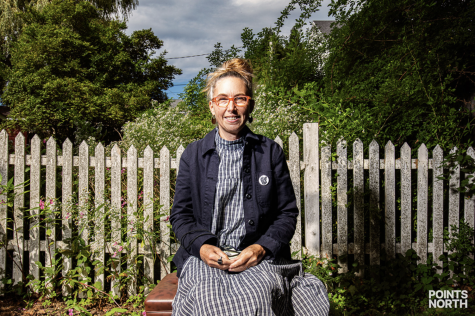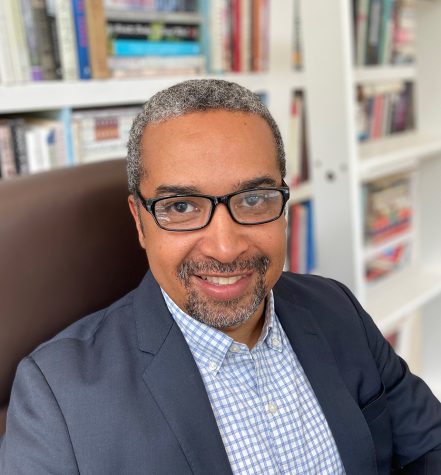Emerson professors named Guggenheim fellows
John Simon Guggenheim Memorial Foundation/ Courtesy: @GuggFellows
April 21, 2022
Two Emerson professors were chosen as Guggenheim Fellows for the 2022 program, bringing the number of Emersonian recipients to six.
The John Simon Guggenheim Memorial Foundation named visual and media arts professor Kathryn Ramey and writing, literature and publishing professor Jerald Walker to its cohort of 186 fellows. The two were selected from approximately 3,000 applicants, all representing different arts-based academic disciplines from across the United States and Canada.

Ramey, selected for the Film – Video category, plans to use her Guggenheim grant to exhibit her film El Signo Vacío—or, The Empty Sign—a feature-length “cinematic essay” examining the United States’s 124-year rule of Puerto Rico.
Ramey said her work on the film originated in 2013, when she discovered that the U.S. was “policing” the Caribbean from a former military base in Puerto Rico—which, coincidentally, was called the Ramey Station of Customs and Border Patrol.
“With the shared surname as a jumping-off point, El Signo Vacío is a re-educational film asking ME/the US viewer to reconsider their role in geopolitics,” she said to The Beacon.
The film is a part of a larger project called Alchemies of Anti-Colonial Cinema Practice, which lends focus on the anthropological aspects of tourism, highlighting new “scholarship” on artistic and anthropological pursuits.
Ramey, an experimental filmmaker and sociocultural anthropologist, has already received a slew of grants and fellowships related to her work, including a residency with the Marble House Project and an arts fellowship with the Social Science Research Council. Her films have been screened at the Toronto and Ann Arbor Film Festivals, as well as the National Museum of Women in the Arts in Washington D.C.
“Through artisanal film processing, my work interrogates, ritually re-imagines, and re-presents [sic] images made by and for the colonist about the lands and peoples they have colonized,” Ramey said. “Alchemies of Anti-Colonial Cinema Practice acknowledges the role the individual consumer/traveler plays in the colonial process and calls on the viewer to examine how they participate in colonial practices and encourages them to stop.”

Applying to the Guggenheim fellowship, she said, was an exciting—and secretive—process. Ramey said the process was essentially “getting a super exciting email and then not being able to tell anyone for over a month.”
Nevertheless, she said the “fairly standard” process wasn’t too intimidating for her, given her familiarity with the structure stemming from previous applications for similar accolades.
“I apply for lots of opportunities for my creative and scholarly research and have the written materials ready to modify for each application,” she continued. “In this case, I had applied to the Guggenheim Foundation the year before so I just had to revise my application for the stage I was in and also contact individuals who would recommend me.”
Visual and Media Arts Chair Cristina Kotz Cornejo stated the VMA Department is thrilled about Ramey’s recognition.
“She is a selfless mentor and educator and is the engine that drives our experimental filmmaking curriculum in VMA,” she said in an email to The Beacon.
Throughout the pandemic, Ramey took on the role of Associate Chair in Production Operations for the VMA department during a period when she was ”knee-deep” in her film, according to Kotz Cornejo.
She also said Ramey remained committed to her work as a filmmaker-anthropologist even while teaching at the college.
“Her work in experimental/analogue film processes and ethnographic research continued and thrived all while contributing to the functioning of the department and education of our students,” Kotz Cornejo continued.
Jerald Walker, a professor of writing, literature and publishing, was selected for General Nonfiction, joining seven other fellows in the category. He described the process as a competitive one because candidates are selected based on “prior achievement and exceptional promise.”
“I kissed my wife, hugged my cat, and gave thanks to organizations like the Guggenheim Foundation that support the arts and intellectual pursuits,” he stated in an email to The Beacon, recalling his reaction to the news.
Walker said he plans to work on a new collection of essays with publisher HarperCollins during his fellowship, which will be his fourth book following How to Make A Slave and Other Essays—a National Book Award finalist in 2020—The World in Flames: A Black Boyhood in a White Supremacist Doomsday Cult, and Street Shadows: A Memoir of Race, Rebellion, and Redemption.
The Guggenheim grant, Walker said, will help give him a “concentrated period of time to focus on research and writing.”
“This one will address pressing issues of race in such a way that blends personal narrative, cultural criticism, and humor,” he said.
Writing, literature and publishing Chair Roy Kamada said Walker—who previously served as department chair—had been a valuable asset to the WLP program for years.
“As a colleague, he is honest, generous, and engaged,” Kamada said. “His students cite his ability to inspire their best creative work, his rigorous work ethic, and his invaluable feedback and advice.”
Kamada spoke highly of Walker’s work—specifically praising his most recent book, How to Make a Slave.
Both Ramey and Walker are members of the School of the Arts, overseen by Dean Robert Sabal.
“I really admire the work of both of these faculty members and am so proud of their accomplishments and the honor they bring to the School of the Arts,” Sabal said.
Emerson has previously celebrated five other Guggenheim fellows, both faculty and alumni. The foundation selected former WLP chair Daniel Tobin as a Poetry Fellow and WLP Professor Jabari Asim as a General Nonfiction fellow in 2009, as well as Elaine McMillion Sheldon ‘13 for the Film-Video. Professor Pablo Medina and alum Denise Duhamel ‘84 were selected as poetry fellows in 2014 and 2020 respectively.
“It is an incredible honor and distinction that comes with funding and time off from teaching to pursue your research,” Ramey said. “I love teaching and my students are so inspiring, but it is hard to fit long-form filmmaking into the academic calendar. Having a full year to complete some work is going to be amazing.”
Correction: An earlier version of this article misspelt VMA Department Chair Cristina Cotz Kornejo’s last name, failed to mention that Tobin also received the fellowship, and featured an image of the Guggenheim museum in New York. The museum is not directly affiliated with the John Simon Guggenheim Memorial Foundation. The Beacon regrets these errors.